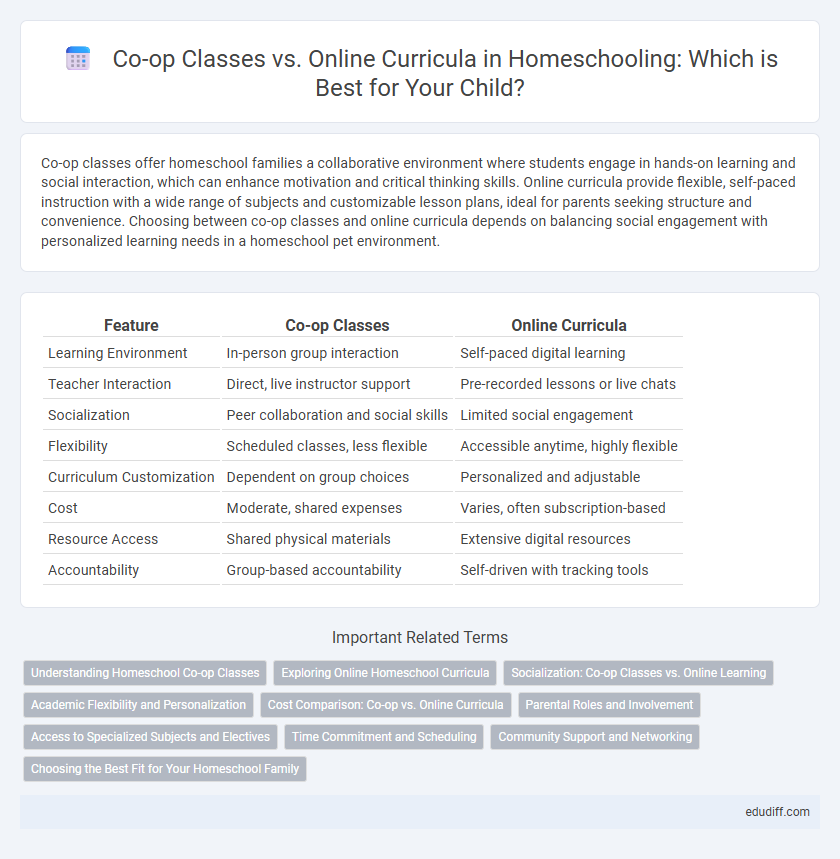Co-op classes offer homeschool families a collaborative environment where students engage in hands-on learning and social interaction, which can enhance motivation and critical thinking skills. Online curricula provide flexible, self-paced instruction with a wide range of subjects and customizable lesson plans, ideal for parents seeking structure and convenience. Choosing between co-op classes and online curricula depends on balancing social engagement with personalized learning needs in a homeschool pet environment.
Table of Comparison
| Feature | Co-op Classes | Online Curricula |
|---|---|---|
| Learning Environment | In-person group interaction | Self-paced digital learning |
| Teacher Interaction | Direct, live instructor support | Pre-recorded lessons or live chats |
| Socialization | Peer collaboration and social skills | Limited social engagement |
| Flexibility | Scheduled classes, less flexible | Accessible anytime, highly flexible |
| Curriculum Customization | Dependent on group choices | Personalized and adjustable |
| Cost | Moderate, shared expenses | Varies, often subscription-based |
| Resource Access | Shared physical materials | Extensive digital resources |
| Accountability | Group-based accountability | Self-driven with tracking tools |
Understanding Homeschool Co-op Classes
Homeschool co-op classes offer collaborative learning environments where families share teaching responsibilities, enabling social interaction and hands-on experiences that online curricula often lack. These cooperative classes provide personalized instruction tailored to group interests and strengths, fostering community support among participating homeschool families. Understanding the benefits of co-op classes involves recognizing their role in enhancing student engagement and supplementing the flexibility of online educational resources.
Exploring Online Homeschool Curricula
Exploring online homeschool curricula offers families diverse, flexible learning options with comprehensive resources and interactive platforms tailored to various educational standards and student needs. These curricula often include multimedia lessons, assessments, and progress tracking, enhancing personalized education beyond traditional co-op class settings. Embracing online programs can provide accessibility for different learning styles and schedules while maintaining structured, accredited academic frameworks.
Socialization: Co-op Classes vs. Online Learning
Co-op classes foster socialization by providing interactive group settings where homeschool students engage in collaborative projects, discussions, and hands-on activities, enhancing interpersonal skills. Online curricula often lack real-time peer interaction, limiting opportunities for spontaneous socialization and group dynamics unless supplemented with virtual meetups or local gatherings. Structured co-op environments offer consistent social engagement, crucial for developing communication skills and peer relationships in homeschool education.
Academic Flexibility and Personalization
Co-op classes offer collaborative learning environments that enhance academic flexibility by allowing students to engage in group discussions and hands-on activities tailored to diverse learning styles. Online curricula provide personalized learning paths with adjustable pacing, enabling students to focus on individual strengths and address weaknesses efficiently. Combining both methods can optimize educational outcomes through adaptability and customized instruction.
Cost Comparison: Co-op vs. Online Curricula
Co-op classes typically incur costs for group materials, instructor fees, and facility use, which can range from $50 to $200 per class, while online curricula often require subscription fees or one-time purchases averaging $100 to $300 per student annually. Families choosing co-ops may benefit from shared expenses and social interaction, potentially lowering individual costs, whereas online programs offer flexible pricing tiers and free options but may include hidden costs such as supplemental resources. Evaluating cost-effectiveness depends on factors like subject specialization, desired interaction level, and material access, making detailed budgeting essential for homeschool planners.
Parental Roles and Involvement
Parental roles in co-op classes require active participation in organizing, teaching, and facilitating group learning, fostering a collaborative environment among multiple families. In contrast, online curricula often place parents in supervisory and motivational roles, ensuring children stay on track independently with structured lessons and assessments. Both approaches demand tailored parental involvement but differ significantly in the level of direct interaction and community engagement.
Access to Specialized Subjects and Electives
Co-op classes provide homeschool families with access to specialized subjects and electives taught by qualified instructors, offering hands-on learning experiences that are often unavailable through standard online curricula. Online curricula offer a wide range of electives and niche subjects through digital platforms, allowing flexibility in scheduling but may lack personalized interaction and immediate feedback. Combining both options can maximize access to diverse courses, balancing convenience and expert instruction in homeschool education.
Time Commitment and Scheduling
Co-op classes offer structured group learning with set meeting times, which can demand consistent weekly attendance and coordination among families. Online curricula provide flexible scheduling options, allowing homeschoolers to work at their own pace and fit lessons around other activities. Choosing between co-op classes and online curricula depends largely on how much time families can commit to fixed schedules versus the desire for adaptable learning hours.
Community Support and Networking
Co-op classes provide homeschool families with direct community support through in-person group learning, fostering collaborative relationships and hands-on interaction among parents and students. Online curricula offer flexible, self-paced education but often lack immediate peer networking opportunities, making community engagement more dependent on external social groups or forums. Homeschool co-ops strengthen social bonds and local resource sharing, which are critical for building supportive homeschooling networks.
Choosing the Best Fit for Your Homeschool Family
Choosing between co-op classes and online curricula depends on your homeschool family's learning style, social needs, and scheduling preferences. Co-op classes offer collaborative, in-person experiences that foster peer interaction and hands-on activities, ideal for families seeking community engagement. Online curricula provide flexible, self-paced instruction with access to diverse subjects and digital resources, perfect for families needing adaptability and individualized pacing.
Co-op Classes vs Online Curricula Infographic

 edudiff.com
edudiff.com